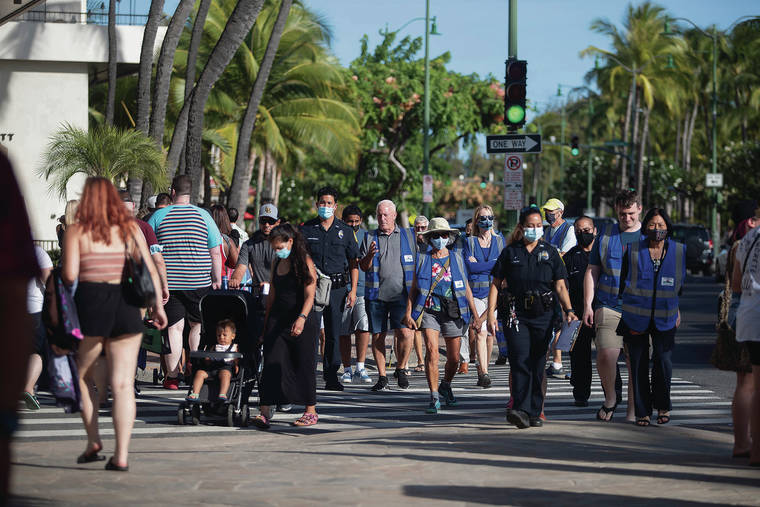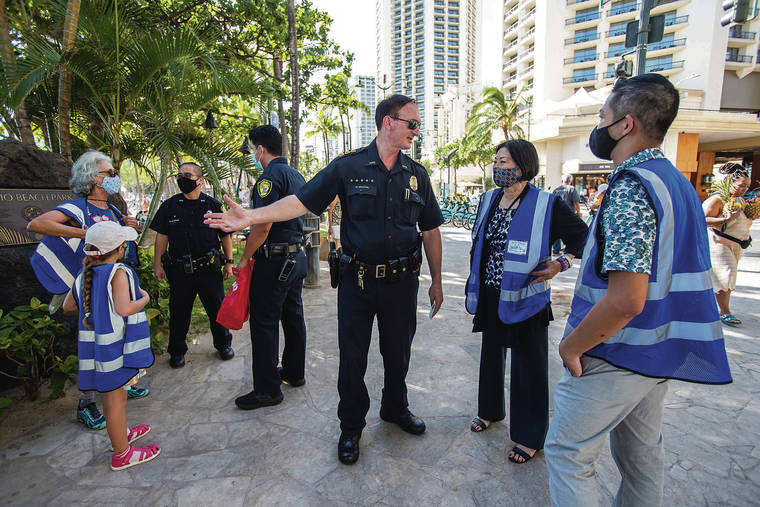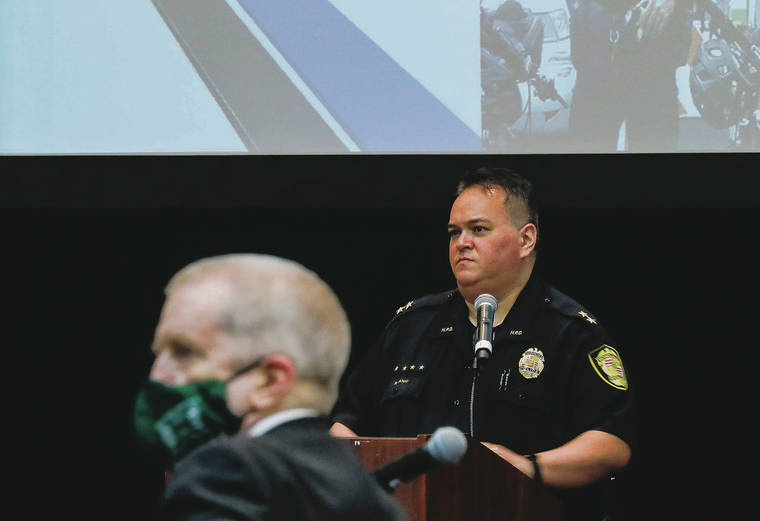Daphne Rice was one of about 10 people who donned a blue Waikiki citizen patrol vest and joined Honolulu police officers on a weekly stroll designed to take back the neighborhood.
The group looked small Thursday as it jostled for positioning on the sidewalks, where high volumes of tourists have returned. They passed Waikiki’s iconic hotels and places with beautiful Diamond Head vistas and ocean views, as well as rundown parts of the bustling district.
Rice nodded and smiled at those she passed — visitors, residents and homeless people alike.
“My goal is to say hello to as many people as I see,” she said. “This is our neighborhood. We have to connect on a personal level if we want to solve the big problems.”
A renewed emphasis on improving public safety in Waikiki began earlier this month, when concerns about serious crimes increased in the state’s top tourism district, where two men were stabbed in separate incidents within hours of each other.
The citizen patrol is part of a multi-pronged approach to address crime and other hazards as tourism comes back and the densely populated neighborhood gets even more congested.
Waikiki is the first police district to restart citizen patrols since the pandemic, and on July 9 it will be the first district to relaunch the “Coffee with a Cop” program, where residents may meet the command, ask questions and voice concerns, Honolulu Police Department District 6 Maj. Mark Cricchio said. The coffee event is scheduled for 5:30-7:30 p.m. at the Starbucks at 2255 Kuhio Ave.
On Wednesday, Waikiki stakeholders participated in the Hawaii Lodging & Tourism Association’s fourth Waikiki Public Safety Conference.
Hawaii Lodging and Tourism Association president and CEO Mufi Hannemann said officials held the last Visitor Public Safety Conference as recently as March but decided to hold another this year “because of some recent incidents that have occurred and our need to be proactive and to work with public safety and other officials to try and resolve some of these issues collaboratively.”
Cricchio called the stabbings “isolated incidents,” and praised police for quickly apprehending the suspects in both crimes.
Public safety
But there’s a general perception among Waikiki residents and business stakeholders that the neighborhood is changing after a noticeable drop in crime during the pandemic.
Law enforcement and other officials now are bracing for more calls for service, especially as the summer rush replaces the ghostly quiet of last year with a Roaring ’20s-like pent-up demand for freedom and travel.
The return of tourism typically means more crime since visitors are easy prey because they are more likely to let their guard down and less likely to participate in prosecution. Also, it is difficult to send a message that crime has consequences in the COVID era of early-release programs aimed at reducing overcrowding in jails and prisons.
Jessica Lani Rich, president and CEO of the Visitor Aloha Society of Hawaii, which assists visitors in crisis, said “one of the things that I’ve noticed as COVID has opened up is that the criminals coming into Waikiki are now bringing weapons with them.”
Police and security officials say they are responding to more calls for service related to domestic violence at Waikiki hotels and thefts of visitor property from beaches, parks and other tourist attractions. There are partiers on the beach, and more trash. Rescues are up. Nuisance complaints about homeless individuals and panhandlers are on the rise.
Public safety has again moved to the forefront of community concerns. Nationally crime is rising, and it continues to be a hot topic at Waikiki Neighborhood Board meetings.
Crime also is a key focus of the state’s visitor industry, which depends on Hawaii’s reputation as a safe destination. That’s why HLTA, the Hawaii Tourism Authority, the Waikiki Improvement Association, the Waikiki Business Improvement District, and the Hawaii Hotel Visitor Industry Security Association are working together to make Waikiki safer.
HTA Chief Administrative Officer Keith Regan said the agency is in the process of encumbering $650,000, which will fund 2022 visitor assistance programs on Oahu, Maui, Hawaii island and Kauai.
“We plan to look for the low-hanging fruit and take action,” Hannemann said.
HPD Interim Chief Rade Vanic participated in Wednesday’s conference, which was his first public community appearance outside of a press conference. He was flanked by HPD Deputy Chief of Field Operations Lisa Mann, Acting Assistant Chief Glenn Hayashi, and Cricchio.
The event also drew Honolulu Prosecutor Steve Alm and Senior Advisor Cheryl Inouye.
A host of city officials also came, including Honolulu City Council Chairman Tommy Waters; city Managing Director Michael Formby; Office of Housing & Homelessness Executive Director Anton Krucky; and Emergency Services Department Director Dr. Jim Ireland.
Vanic told conference attendees, “I look around the room and I see the people at the table here and it just shows the level of commitment.
“We come here for just a small part on the southern coast, but that small part is such a vital key part of what Honolulu is about,” he said. “It’s about people coming and experiencing the best that Hawaii has to offer. It’s about one of our economic centers and hubs. It’s about making sure that as we start to reopen as a city that we make sure that not just our residents but our visitors feel safe.”
Forming partnerships
Vanic said HPD’s budget took a $13 million hit because of COVID, but said the agency understands that it has a job to do and will get it done, especially if it is supported.
“We are doing our part solving and preventing crime. But even if we are solving and preventing crime, we need to make sure that people feel safe and that there’s a perception of safety. It’s not something that the police can do by ourselves.”
He said he’s “super excited” to partner with the Honolulu prosecutor on Weed and Seed. As part of the program, law enforcement officers would weed violent criminals from the streets, while working with the community to reduce crime. Prevention, intervention, treatment and neighborhood restoration are the focus of the seeding part of the program.
Vanic said HPD also is working with the city’s Office of Housing & Homelessness, which is bringing new programs like Crisis, Outreach, Response and Engagement to urban Honolulu, including Waikiki.
CORE , which falls under the city Emergency Services Department, works to divert 911 calls with the goal of getting homeless people into services that are appropriate to their struggle so they aren’t tapping police, ambulance services and emergency rooms when they don’t need them.
Krucky said he expects CORE will begin setting up its offices in the old fire department in Iwilei in July, and hopes to have “wheels on the street” in September. Krucky said the program, which will kick off with about eight employees, is expected to cost about $3.5 million the first year, which will be paid for through the American Rescue Plan Act and possibly other sources.
The city is hoping the launch will help mitigate an increase in homelessness and mental health challenges due to pandemic-related fallout. Krucky said CORE cannot force homeless people into stabilization beds or shelter, but hopes to build enough trust that they will want to go.
The state’s moratorium on evictions ends on Aug. 6 and there are thousands of people who are struggling to pay their rent or mortgage. Honolulu also is still grappling with a high unemployment rate, which was 6.7% on a non-seasonally adjusted basis in May.
Waters put restricting 4 a.m. cabaret liquor licenses to hotels and resorts in the district back on the table. The issue came up in 2018 during HLTA’s inaugural public safety conference, which was held when the military was considering placing parts of Waikiki off limits due to violent crimes against the military.
“Bar owners will be very upset. But I’d like some feedback,” Waters said, adding that a 2017 shooting that killed one and injured two others was outside of a 4 a.m. bar on Kuhio Avenue.
Waters said he wants to see increased police visibility in Waikiki and may propose using federal American Rescue Plan Act funds to beef up HPD’s budget, especially if it helps the department with recruitment to fill shortfalls in its ranks.
Alm said Waikiki is the next logical area to bring Weed and Seed after proof of concept is established in Kalihi-Palama-Chinatown- Ala Moana-Sheridan, Waipahu, and Ewa-Ewa Beach. He’d like to start Waikiki planning efforts by year’s end.
“(Waikiki) is a lot bigger area than Chinatown or Kalihi and densely populated, but things like sex trafficking of juveniles, a lot of it that takes place here,” Alm said. “And I don’t think that there’s a homeless kid on this island that hasn’t spent time in Waikiki.”
Cricchio said Weed and Seed is very promising.
“In my 31-year career, that’s where I see the problem prosecutors and courts. We are doing our job. We are arresting them, but it’s got to continue,” he said.
Still, Cricchio said that police must prepare for the possibility that concentrated crackdowns in new Weed and Seed areas could push criminals into other districts like Waikiki, where the program has not started.
Rep. Adrian Tam (D, Waikiki-Ala Moana-Kakaako) and Sen. Sharon Moriwaki (D, Kakaako-McCully-Waikiki) are among those who want to make it tougher for criminals to frequent Waikiki. They joined Waikiki residents Thursday on the HPD guided citizen patrol.
Moriwaki said she supports Weed and Seed and will work with Waters on the possibility of placing some restrictions on late-night liquor licenses. She also plans to propose another Safe Neighborhoods bill that would ban repeat offenders during certain hours from business and resort districts unless they live or work there.
Tam said he is considering legislation that would allow visitors who have been victims of a crime to testify in court via teleconference.
“People don’t always think it’s worth it to come back,” he said.
Cricchio was enthusiastic about their proposals and others that he heard at Wednesday’s public safety conference, and hopes that the timing is right to make a difference.
“No one can do it alone, it’s got to be collaborative,” Cricchio said. “People are fed up with it and want something done. Everyone is very gung ho right now, but I want to see it come to fruition.”
—
Citizen patrols restart
>> Waikiki Community Center Citizen Patrol meets Tuesdays at 4:30 p.m. at the Waikiki Community Center, 310 Paoakalani Ave.
>> Waikiki West Citizen Patrol meets Tuesdays at 6:30 p.m. at Eaton Square, 438 Hobron Lane.
>> Waikiki East Citizen Patrol meets Thursdays at 4:30 p.m. at the big banyan tree on Kalakaua Avenue near Uluniu Avenue.
>> Ala Wai Small Boat Harbor Citizen Patrol meets by the harbor master’s office Thursdays at 7 p.m.
For more information, visit 808ne.ws/HPD6 or contact HPD Officer Stephanie Virardi at 723-3349 or svirardi@honolulu.gov.








